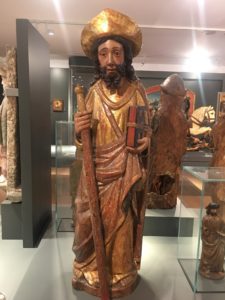 From Santiago de Compostela: I felt compelled over the course of the day and a half I had given myself in Santiago to visit the tomb and what it embodied several times. I made my way to the beautiful museum of pilgrimage just off to the side of the cathedral, and spent a wonderful morning diving into the history of what I had done, and reveled in the art preserved there. I’ve always loved paintings from the past and what they can tell us about the world that preceded us.
From Santiago de Compostela: I felt compelled over the course of the day and a half I had given myself in Santiago to visit the tomb and what it embodied several times. I made my way to the beautiful museum of pilgrimage just off to the side of the cathedral, and spent a wonderful morning diving into the history of what I had done, and reveled in the art preserved there. I’ve always loved paintings from the past and what they can tell us about the world that preceded us.
My heart was so very light during those two days. I felt like all the weight that I carried in my work as professor and pastor had been lifted from me. I had no burning issues to weigh me down. I had managed to resolve my life’s questions, at least for that moment in time. It may have been as light and happy as I have ever been.
Matthew 9:2-8 – 2 And there people brought to him a paralytic lying on a stretcher. When Jesus saw their faith, he said to the paralytic, “Courage, child, your sins are forgiven.” 3 At that, some of the scribes said to themselves, “This man is blaspheming.” 4 Jesus knew what they were thinking, and said, “Why do you harbor evil thoughts? 5 Which is easier, to say, ‘Your sins are forgiven,’ or to say, ‘Rise and walk’? 6 But that you may know that the Son of Man has authority on earth to forgive sins”—he then said to the paralytic, “Rise, pick up your stretcher, and go home.” 7 He rose and went home. 8 When the crowds saw this they were struck with awe and glorified God who had given such authority to human beings.”
For reflection: Archbishop Julian Barrio of Santiago wrote, “The sanctuary of the Apostle in Santiago de Compostela, like all other places of pilgrimage, is not an end in itself, but acts as a threshold giving access to new stages of life through the encounter with the Lord at the behest of the Apostle St. James. The jacobean pilgrimage is undertaken not to obtain some privileged experience, but to allow oneself to be changed in a way impossible to predict, and so return to ordinary life with completely new attitudes.”[1]
Have you, in any way, changed, perhaps been healed? Were you able to let go of hurts and their accompanying grudges? Healed family memories? Let go of poisonous relationships? Reengaged with life? Learned to love yourself? Can you join the crowd observing Jesus, struck with awe yourself, glorifying God for what had been done for you?
If you listen carefully, you just might hear the voice of Jesus saying, as you pack your bags to head to the airport, “Rise, pick up your stretcher, and go home.”
[1] Julián Barrio Barrio, Archbishop of Santiago de Compostela in Pilgrims of Faith and Witnesses to the Risen Christ: The Archbishop of Santiago’s Pastoral Letter for the Compostellan Holy Year 2010, p. 108.